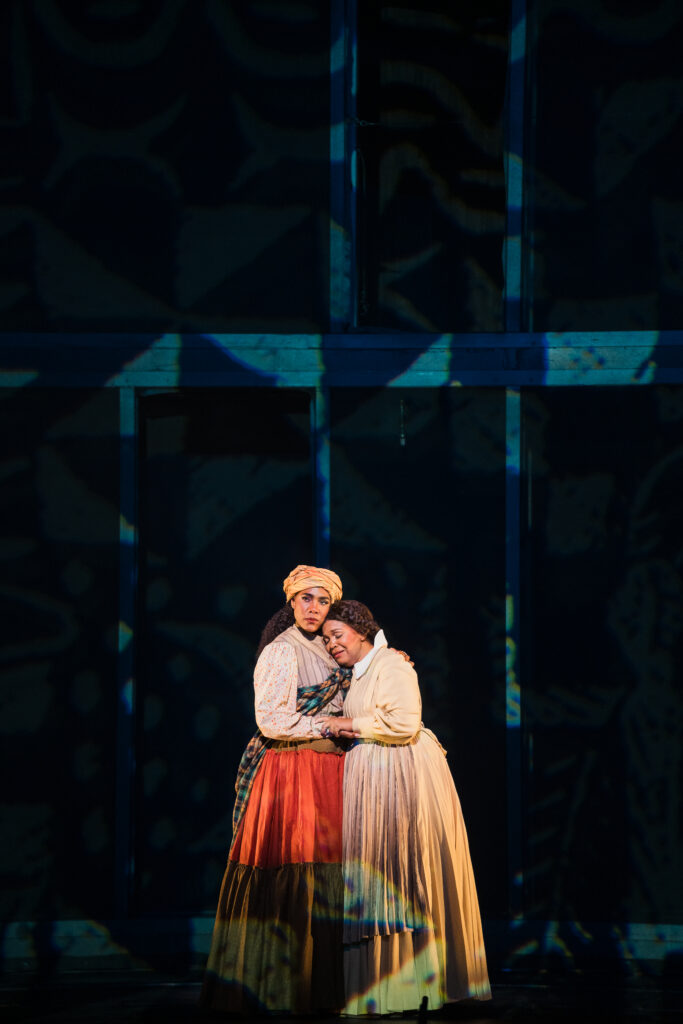Singers’ conviction vies with weaknesses of Heggie’s “Intelligence” in HGO premiere

Jake Heggie’s career hit a high-water mark last month when the Metropolitan Opera opened its season with Dead Man Walking, his most performed work. But for composers, like everyone else, life goes on. What has Heggie done for the world lately?
Heggie brought out his latest work, Intelligence, which Houston Grand Opera premiered Friday evening at Wortham Theater Center.
Intelligence springs from a real-life story of the Civil War, when a woman in the heart of the Confederacy ran a spy ring that gathered military information and slipped it out to the Union military. While historians long overlooked stories like this—which wasn’t unique—these activities are being rediscovered and celebrated as examples of women’s empowerment and impact.
Elizabeth Van Lew belonged to the wealthy white aristocracy of Richmond, Va., but she abhorred slavery. After the war broke out, she set up a spy network that included Mary Jane Bowser, a black woman enslaved by Van Lew’s family. The family had always given Mary Jane special treatment, from having her baptized in the white church to sending her to the North for an education.
Heggie, librettist Gene Scheer, and stage director Jawole Willa Jo Zollar built out the scenario from there. The result is an opera that unfolds slowly—the plot can hardly advance a step without someone stopping to meditate on it—but delivers powerful dramatic outpourings at its best. The impact comes at least as much from the principals’ fiery, full-throated singing as from the score itself.
Heggie and his collaborators have put Mary Jane at the center. As Intelligence begins, she longs to understand her origins, because she has no memory of her parents; that restlessness becomes a motif in the story. Elizabeth sends her to work as a servant in the Southern White House, where she rifles through President Jefferson Davis’ own desk to unearth secrets. The opera climaxes when Mary Jane learns the long-suppressed truth about her family and vows to take control of her own existence.
Even before ringleader Elizabeth makes her entrance, Mary Jane encounters Lucinda, an enigmatic figure only she and the audience can see, who becomes a sort of spiritual guide to her. The story’s antagonist is Travis Briggs, a loyal Confederate who suspects the women are up to something. Another potential threat comes from Elizabeth’s sister-in-law, Callie, who is in the dark about the spying but falls under Travis’ influence.
While much of Intelligence’s score unfolds in a tradition-rooted style akin to Heggie’s other works, the music for Mary Jane and Lucinda has tinges of blues and gospel. More importantly, two key scenes mark a conspicuous departure—not only from Heggie’s past works, but from just about any operas that come readily to mind.
In Act 2, Mary Jane experiences a spiritual rebirth depicted not through singing, but through dance. That scene revolves around eight women in African costumes who represent spirits of her ancestors, sweeping her up in an exuberantly athletic sequence propelled by pounding percussion. And after Mary Jane finally decides to break free of her past, Heggie’s score again leaves voices behind and devotes the finale to another explosion of dance.
When the spotlight is on the singers, though, Heggie often sends their voices soaring to embody their emotions, anxieties, and resolve. He obviously aims for Intelligence to deliver its share of old-fashioned vocal thrills. The principals by and large delivered on Friday. Soprano Janai Brugger and mezzo-soprano J’Nai Bridges—as Mary Jane and Lucinda, respectively—poured out generous, soulful sound. Brugger’s voice lost some of its vibrancy and color at the top, but she brought a quiet fervor to the gentle lyricism near the opera’s close.
As Elizabeth, mezzo-soprano Jamie Barton at times exulted in red-blooded, walloping tones that were so electrifying when she played the heroine of Donizetti’s La Favorite right before the pandemic. Her gutsy opening salvo in Intelligence—putting Travis in his place after his feeble attempt to trick her—showed that Elizabeth was a tough customer. But as the opera unfolded, Barton’s singing also pointed up the fact that Heggie’s music is sometimes the most effective when it’s the simplest.
Elizabeth’s big scene in Act 1, denouncing the hatred and ignorance she saw around her, offered a case in point. It began with Barton almost unaccompanied, singing with hushed intensity. That made the music all the more arresting as it gradually rose in declamatory force—and as her voice swelled into a flood.
Thanks to baritone Michael Mayes, a powerful Rigoletto for HGO in 2019, Travis exuded snarling menace. Soprano Caitlyn Lynch’s voice mixed brightness and flashes of greater substance, revealing the weight of Callie’s quandary when she learned about the spying. Tenor Joshua Blue sang with vibrancy and ardor as Wilson, Mary Jane’s husband, but his voice turned strident toward the top, where Heggie’s music often took it. Bass Nicholas Newton brought resonance and dignity to the role of Henry, a servant at the Davis house who falls in love with Mary Jane.
Ultimately, the cast’s conviction was just not enough to make Intelligence convincing. A prime example came at the opera’s climax, when—this isn’t revealing anything one wouldn’t expect—Travis has just been killed. The melee involved Wilson, Mary Jane’s husband, and Henry, who loves her, and the two faced one another for the first time, with her in between. Even though Travis’ body is waiting to be dealt with, the three had a discussion about Mary Jane’s future. Henry pleads with her to go away with him; Wilson describes Mary Jane’s personality and insists that Henry doesn’t understand her. Henry, trying to resolve the impasse, suggests that all three run off together—at which point Friday’s audience laughed.
Just as the dance ingredient is the most distinctive part of Heggie’s score, Zollar’s staging was most striking for involving dancers almost all the time. Zollar, first noted as a choreographer—founder of the New York dance company Urban Bush Women, source of Intelligence’s eight dancers—explained her approach in a choreography showcase HGO hosted last summer. Her staging, she said, draws on African cosmologies that view spirits of the past, present and future as always around us.
So the dancers often were off to the sides, observing almost motionlessly or amplifying a scene’s dynamics with gestures of supplication or rebellion. When Mary Jane first went to the Davis house, the dancers helped her overcome her hesitation, surrounding her and pulling her forward. The approach helped heighten the story without competing with the principals. And the eight dancers performed with sinuousness, deftness and zest.
The HGO Orchestra, led by conductor Kwamé Ryan—debuting with the company—brought the score vigor and clarity, and it filled the two big dance scenes with energy. Mimi Lien’s simple sets consisted mainly of movable surfaces that turned into de facto screens for video projections by Wendall K. Harrington and Rasean Davonte Johnson, which did most of the scene-setting, from swirling seas to the grounds of a plantation. The uncluttered stage helped keep the focus on Intelligence’s compelling principals: the three B’s of Brugger, Bridges and Barton.
Intelligence runs through November 3. houstongrandopera.org
